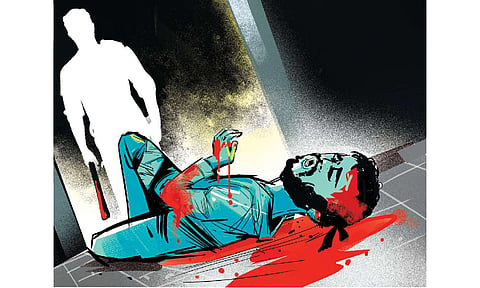

Reports of yet another case of custodial death of a citizen in Tamil Nadu are a stark reminder about the widespread prevalence and perpetration of custodial violence in the name of criminal investigation.
Despite being known otherwise as a progressive state, Tamil Nadu has a blood-stained record in custodial injuries and deaths and the so-called encounter killings. Under different regimes, state police have had a free run and often resorted to extra-judicial methods with impunity.
In the present case, the custodial death of a temple security guard in Sivaganga district has sent reverberations of shock and dismay among people. The unprecedented brutality was horrifying.
Commenting about the injuries reported in the autopsy, the Madurai bench of the Madras High Court was constrained to say that “Even an ordinary murderer would not have caused this much injury to a person…” Men in uniform, whose duty is to protect people’s lives in certain cases, become worse than the murderers they are supposed to bring to justice.
The anger, shock and indignation among people were palpable. The political opposition seized the opportunity to mount an attack on the state government and force it to take strict action. The high court, too, did not mince words in reprimanding the government. With elections due in 2026, the ruling DMK party did not want to take chances. Chief Minister MK Stalin tried to defuse the situation and blunt the criticism with a series of steps to placate the angry and grieving family and local communities, such as apologising to the victim’s family, and giving the victim’s brother a government job and a residential plot as compensation. The state government also took prompt action against some police officials and men. The superintendent of police was placed on compulsory wait while five policemen were arrested and charged with murder. Subsequently, it transferred the case to the CBI as there were apprehensions that evidence was being destroyed and the state police investigation might not be fair.
The recurrence of cases of custodial violence makes it imperative for governments to take action to end the barbaric practices and heinous crimes. Firstly, India should enact an anti-torture law. Without a stringent law, the state police machinery tends to dilute or derail the investigation to protect their deviant colleagues.
Secondly, though the Supreme Court ordered the installation of CCTV cameras in the police stations, it has not been fully implemented, and if implemented, police men find a way to dodge it. Though paying compensation may help the family financially and can find solace by construing it as a measure of dispensing justice, many believe that it normalises the crime. The film industry, too, is guilty of making films glorifying trigger-happy “encounter specialists” and influencing people to acquiesce to vigilante justice. Unlike in films, in real life, police officials rarely turn their weapons against the powerful and rich criminals, as victims of police excesses are poor people or people fighting against the state.
Tamil Nadu police have been receiving plaudits for being an “efficient model police force”, but when it comes to the investigation of crimes, it continues to employ brutal torture to extract confessions and “solve” crimes. Neither sensitisation of police against torture nor having systems to hold errant officials accountable has been done sufficiently to minimise custodial violence.